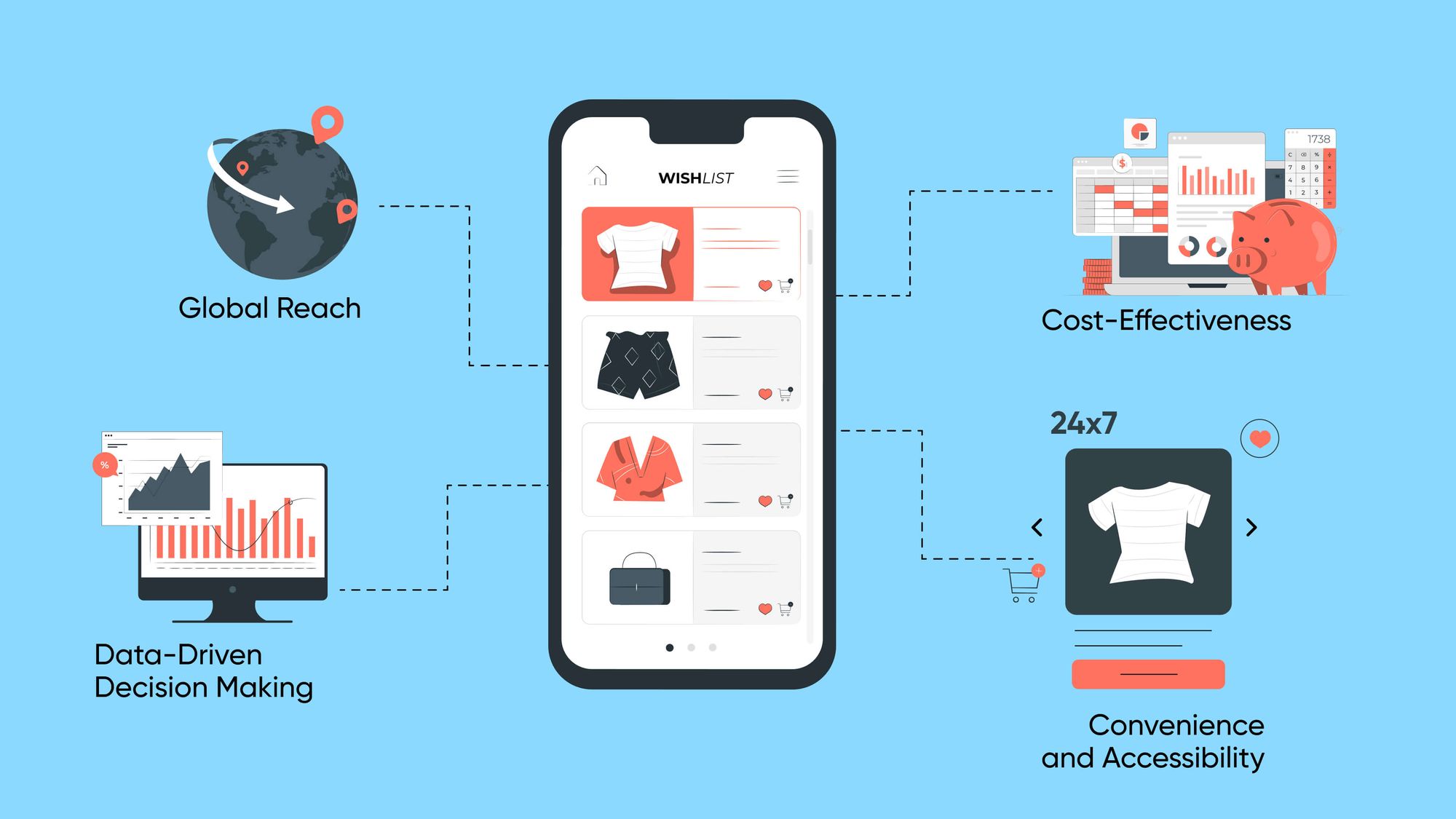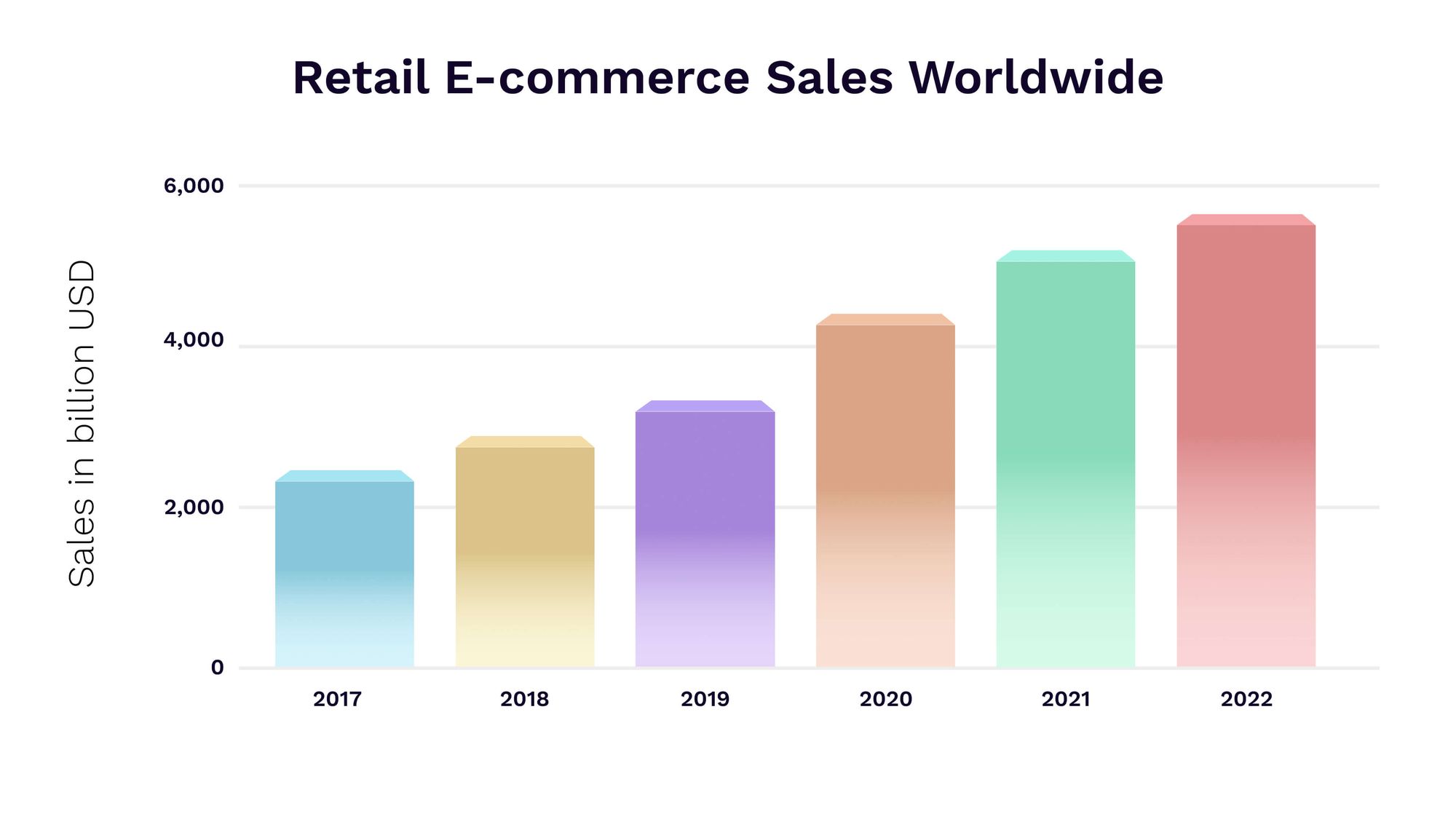Is Ecommerce Still Worth It In 2024?
Discover if e-commerce is still worth pursuing in 2023 and gain the knowledge needed to make informed decisions in this ever-changing market. This comprehensive article examines the benefits, challenges, and profitability of e-commerce, equipping aspiring entrepreneurs with valuable insights.

In recent years, e-commerce has experienced unprecedented growth, revolutionizing the way people shop and do business. With the rapid advancement of technology & AI, many individuals are considering venturing into the realm of online entrepreneurship. However, before taking the plunge, it is crucial to evaluate whether e-commerce is truly worth it.
This article delves into the various aspects of e-commerce, exploring its benefits, profitability, and challenges, and providing valuable tips for starting an e-commerce business in 2024.
Are you worrying about the future of e-commerce?
As with any industry, concerns about the future of e-commerce are understandable. However, if you are planning to start your e-commerce business in 2024, embracing the benefits of AI in e-commerce can be a game-changer.
Artificial Intelligence (AI) is reshaping the e-commerce landscape, offering exciting prospects for businesses and customers alike. AI-powered technologies such as chatbots, recommendation engines, and AI shopping assistants are enhancing the customer experience by providing personalized support and product suggestions. AI-powered e-commerce tools enable smarter product search and inventory management, ensuring efficient operations. Furthermore, AI aids in fraud detection and prevention, offering robust security measures. The future of e-commerce will witness hyper-personalization, voice commerce, and seamless integration of AI, revolutionizing the way we shop online.
Ecommerce business benefits

Global Reach & Market Expansion
Ecommerce enables businesses to reach a global audience, breaking down geographical barriers and expanding market potential. Access customers from around the world without the need for physical store locations.
Increased Convenience for Customers
In 2024, convenience is a top priority for customers. Ecommerce lets them shop anytime, anywhere, providing a seamless and personalized experience. Shopping from the comfort of their homes with easy navigation, quick search options, and secure payment gateways enhances customer satisfaction.
Cost Savings and Lower Overhead
Starting an online store typically requires lower upfront costs compared to setting up a traditional retail store. Compared to brick-and-mortar stores, ecommerce businesses require a lower initial investment and have reduced overhead costs. Avoid expenses such as rent, utilities, and physical inventory storage, resulting in higher profit margins.
Data-Driven Decision Making
Ecommerce platforms offer powerful analytics tools, providing valuable insights into customer behavior, preferences, and purchasing patterns. Leverage this data to make informed business decisions, optimize marketing strategies, and personalize the customer experience.
Scalability and Flexibility
Ecommerce businesses have the advantage of scalability, allowing easy expansion as the business grows. Adapt to changing market conditions, introduce new products, and adjust operations swiftly to meet customer demands.
Competitive Edge and Brand Visibility
In a competitive market, ecommerce provides an opportunity to stand out. Effective branding, marketing strategies, and customer-centric approaches can help your business gain a competitive edge and enhance brand visibility.
Integration of Emerging Technologies
Embrace emerging technologies like artificial intelligence (AI), virtual reality (VR), and augmented reality (AR) to provide unique and immersive shopping experiences. Stay ahead of the curve and meet evolving customer expectations.
Is starting an ecommerce business worth it in 2024?
Undoubtedly, starting an e-commerce business in 2024 holds great potential. The ongoing digital transformation, coupled with the changing consumer landscape, creates numerous opportunities for aspiring entrepreneurs. However, success in the e-commerce realm requires careful planning, thorough market research, and a few more things to consider when starting an e-commerce business.
Is e-commerce profitable?

Profitability in e-commerce can vary depending on various factors such as the niche, target market, competition, and business model. E-commerce is still growing as some e-commerce ventures achieve remarkable success and profitability, while others may struggle to generate substantial profits. To increase the chances of profitability, businesses should focus on factors like product selection, e-commerce customer journey, competitive pricing, effective marketing, exceptional customer service, and efficient logistics.
Top challenges of building an ecommerce business today
Intense Competition
The e-commerce industry is highly competitive, with numerous players vying for customers' attention. Standing out in a crowded market requires a unique value proposition, effective branding, and a well-defined target audience.
Customer Trust
Building trust with online customers can be a challenge. Addressing concerns related to security, privacy, and the authenticity of products is crucial to establishing credibility and fostering long-term customer relationships.
Operational Complexity
Managing an e-commerce business involves various aspects, including website development, inventory management, order fulfillment, shipping logistics, and customer support. Navigating these complexities requires careful planning, organization, and leveraging technology solutions.
Marketing and Customer Acquisition
With the abundance of online businesses, acquiring and retaining customers can be a daunting task. Effective marketing strategies encompassing search engine optimization (SEO), social media marketing, content creation, and influencer partnerships are essential to driving traffic and boosting conversions.
Evolving Technology
E-commerce is highly dependent on technology, which evolves rapidly. Staying updated with the latest trends, adopting marketing automation software, and optimizing user experience are necessary to stay competitive.
Is ecommerce the same as dropshipping?
E-commerce and dropshipping are related but not the same. E-commerce refers to the broader concept of conducting business online, encompassing various business models, including drop shipping. Dropshipping is a specific e-commerce model where the retailer does not keep products in stock. Instead, when a customer places an order, the retailer purchases the product from a third-party supplier who directly ships it to the customer. Dropshipping eliminates the need for inventory management and upfront investment but requires careful supplier selection and effective customer service.
5 tips for starting an ecommerce business
Thorough Market Research
Before diving into the world of e-commerce, it's crucial to conduct thorough market research. Identify a profitable niche that aligns with your interests and expertise. Study consumer behavior, trends, and competition in your chosen market. Look for untapped opportunities or gaps that you can fill with your products or services. Understanding your target audience and the market landscape can position your business for success.
Develop a Solid Business Plan
A well-structured business plan is essential for any e-commerce venture. Define your business goals, outline your products or services, and establish a pricing strategy. Identify your target audience and create a marketing plan that includes digital marketing channels, social media strategies, and customer acquisition tactics. Additionally, outline your financial projections, including revenue streams, costs, and profit margins. A comprehensive business plan serves as a roadmap for your e-commerce journey, helping you stay focused and make informed decisions.
Focus on User Experience
User experience plays a crucial role in the success of an e-commerce business. Design a visually appealing and user-friendly website that reflects your brand identity. Ensure that your website is optimized for mobile devices, as a significant portion of online shopping now takes place on smartphones and tablets. Streamline the purchasing process, provide clear product information, and offer multiple payment options to enhance the overall user experience. A seamless and enjoyable shopping journey can significantly impact customer satisfaction and drive repeat business.
Invest in Marketing
To stand out in a competitive e-commerce landscape, a solid marketing strategy is essential. Develop an omnichannel or multi-channel marketing approach that includes leveraging marketing automation tools for your business using multiple channels like email, WhatsApp, Messenger, Instagram automation, and more. Optimize your website and product descriptions for relevant keywords to improve your organic search rankings. Leverage social media platforms to engage with your target audience, share valuable content, and promote your products. Email marketing campaigns can help you nurture customer relationships and drive repeat purchases. Consider allocating a budget for paid advertising on platforms like Google Ads or social media platforms to increase your brand visibility and attract targeted traffic to your website.
Prioritize Customer Service
Exceptional customer service is a cornerstone of a successful e-commerce business. Prioritize prompt and personalized customer support to build trust and loyalty. Be responsive to customer inquiries and address any concerns or issues promptly. Invest in reliable communication channels, such as live chat or email, to provide quick assistance. Consider implementing a robust returns and exchange policy to offer customers peace of mind. Actively seek customer feedback and leverage it to improve your products, services, and overall customer experience. Positive word-of-mouth and satisfied customers can become powerful advocates for your brand, driving organic growth.
Bonus Tip: Embrace the Power of AI
Incorporating AI (Artificial Intelligence) into your e-commerce business can provide a competitive edge and enhance various operations. Adapt free ai tools to streamline processes, personalize customer experiences, and drive sales. AI algorithms analyze customer data for personalized recommendations, while chatbots and virtual assistants improve customer service and engagement. Additionally, AI optimizes inventory management and forecasts demand accurately, preventing stockouts. By strategically leveraging AI, you can unlock new opportunities and propel your e-commerce business to greater heights.
The Final Thoughts on Starting an E-commerce Business
E-commerce undoubtedly presents tremendous opportunities for aspiring entrepreneurs in 2024. However, success in the online business realm requires careful planning, adaptability, and continuous efforts to provide an exceptional customer experience. By embracing the benefits, overcoming challenges, and implementing effective strategies, e-commerce businesses can thrive and harness the full potential of the digital marketplace.

.png)
